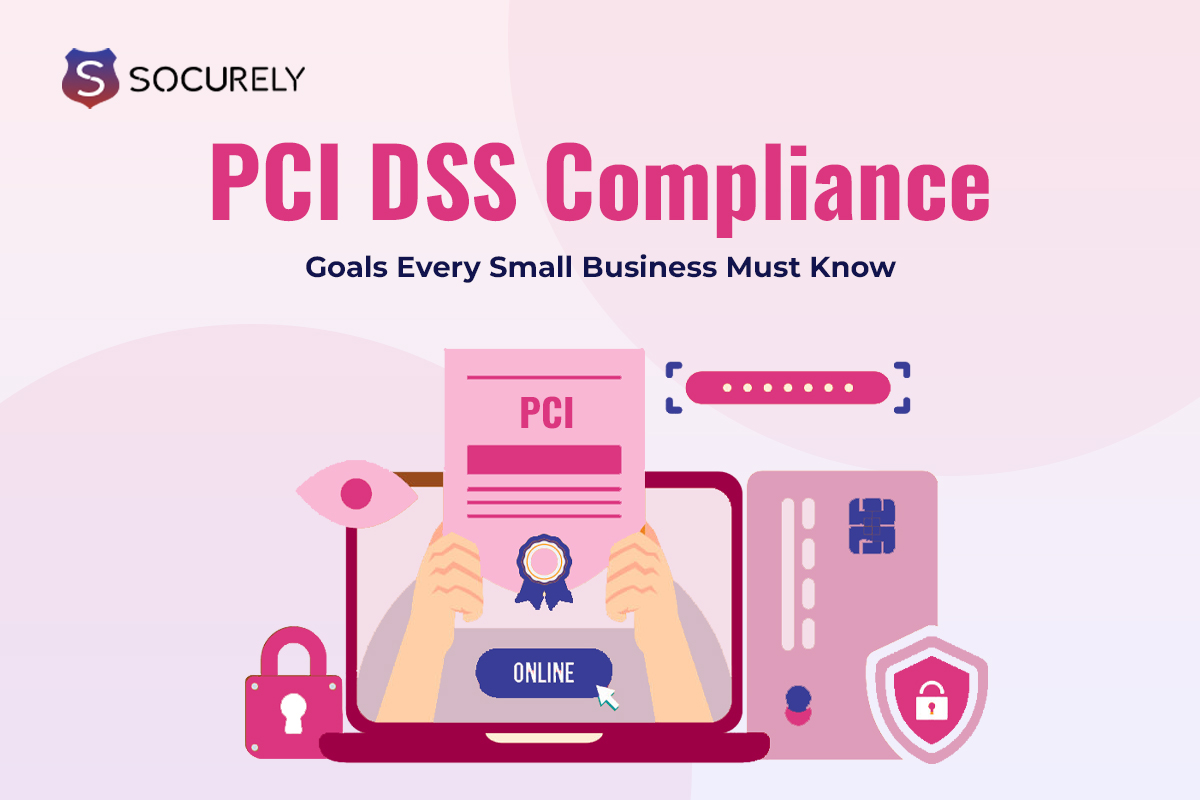- 79% of businesses are concerned about their online information
- 59% of people still do not know what happens with the online gathered data
- 27% of data breaches involved small businesses
- 90% of data breaches are financially motivated
Are you a small business looking to enhance your payment security and earn the trust of your customers? Achieving PCI DSS compliance is a crucial step in safeguarding sensitive payment data.
In a US-based fact-tank Pew Internet Research, a staggering 79% of respondents expressed concern about how businesses exploit their information online. Furthermore, 59% of people are unaware of what happens to their data once it is gathered.
Also, the 2021 Data Breach Investigations Report states that 27% of data breaches involved the accommodation and food services industry, making it crucial for small businesses in this sector to prioritize PCI DSS compliance. The same report highlights that 90% of breaches are financially motivated, emphasizing the need for robust payment security measures.
This is where PCI DSS, also known as the Payment Card Industry Data Security Standard, is useful. The credit card processing industry uses this term frequently, but what does PCI DSS compliance mean, and why your small business should even care?
Let’s unlock the need and importance of PCI DSS Compliance goals for small businesses, in this blog.
What is PCI DSS?
PCI DSS is a set of security standards established by the Payment Card Industry Security Standards Council (PCI SSC) to ensure the secure handling of cardholder information during payment transactions. It is used by major credit card companies like Visa, MasterCard, American Express, Discover, and JCB, these standards aim to protect cardholder data from theft and misuse.
The purpose of this compliance was to guard against fraud and data theft involving credit and debit card transactions. This organization’s founding members have equal input over how it is operated and what gets accomplished.
It applies the bare minimal security measures that are required to be in place to reduce the likelihood that cardholder data will end up in the wrong hands. According to this standard, every organization that handles, transmits, or maintains cardholder data ought to verify that it complies with PCI-DSS.
Therefore, to be better prepared in the case of a breach or expensive lawsuits in the future, you as a SaaS firm small business need to meticulously comply with PCI DSS requirements. Also, businesses must comply with the different PCI DSS levels to get the utmost security needed.
What is the goal of PCI DSS compliance?
No matter where cardholder data is handled, stored, or transported, PCI DSS aims to protect it. The main account number (PAN), which is printed on the payment card, and other cardholder account data must be protected by the 12 security controls and procedures mandated by PCI DSS.
Goals Of PCI DSS Compliance
- Build A Secure Network
- Protect Cardholder Data
- Build A Vulnerability Management Program
- Get Secured Access Controls
- Non-stop Monitoring
- Maintain The Security Policy
Let’s discuss this goal in a detailed way-
-
Build A Secure Network-
PCI DSS’s first objective is to create and maintain a secure network. To protect cardholder data, businesses must implement robust security measures. This includes installing and maintaining a firewall configuration to protect data and using secure configurations for all system components.
For example, a small online retailer might deploy advanced firewall solutions and regularly update their network security protocols to prevent unauthorized access.
Additionally, avoid using any default system passwords provided by the manufacturer. In little time at all, cybercriminals will have simple access to the default passwords. To prevent hackers from taking advantage of internal networks and compromising data, you must disable and change the default passwords. Furthermore, to guarantee the security of the internal network, all undocumented services have to be deleted.
-
Protect Cardholder Data
Encryption is vital when storing and transmitting cardholder data. Businesses must ensure that all sensitive data is encrypted using strong cryptographic protocols.
Cardholder data must be processed and used, but it also needs to be stored securely. To guard against potential theft and misuse, certain precautions should be taken to secure stored cardholder data.
This essentially means that you should never store cardholder data—if you don’t need it, don’t keep it. However, you should make sure that you only keep the bare minimum of cardholder data necessary for business or regulatory requirements when storage is not an option.
This can contain details like the billing address and name of the customer, but it never includes any information that might jeopardize the security of a transaction, such as sensitive authentication data (SAD).
A real-life example is a small e-commerce business encrypting all payment transactions to safeguard customer information from interception during online purchases.
-
Build A Vulnerability Management Program
The next step is to maintain a strong vulnerability management program that includes anti-virus software or programs and other safeguards to secure cardholder data to effectively defend against cyber threats.
Importantly, end users shouldn’t be able to disable antivirus software without permission from management. Antivirus products should be updated regularly, configured to scan regularly and produce audit reports. This may entail, for instance, making sure P2P file sharing is either strictly prohibited or controlled.
Among the frequent weaknesses include, but are not exclusive to:
- Scripting on several websites
- Forgery of requests across sites
- Overflows in the buffer six PCI DSS compliance objectives
Web applications that are accessible to the general public should be inspected using a Web Application Firewall and specialist instruments or techniques (Pentesting).
A practical example is a small software company that regularly updates its software to address security vulnerabilities and employs comprehensive antivirus solutions to protect against malware.
Also, read- What Are PCI DSS Requirements For Small Businesses?
-
Get Secured Access Controls-
Access to cardholder data should be restricted based on the need to know. This includes assigning unique IDs to each person with computer access and implementing physical access controls.
To prevent data from being exposed needlessly, administrators only provide employees access privileges over the areas that are necessary for them to perform their jobs effectively. To safeguard key assets, businesses should always configure default “deny all” settings for granular permission about system components. Under the PCI goals, additional measures consist of:
- To access system components, each user needs to authenticate with a unique ID.
- You may make people answerable for their deeds in this way.
- Passwords must be a combination of letters and digits and be at least seven characters long.
- Use Multi-Factor Authentication (MFA), which calls for a password and an additional degree of authentication.
- Usually, a code delivered to another device—like your phone, smart card/key fob, or biometric scan—is used to do this.
For instance, a small financial services firm might use multi-factor authentication and restrict access to sensitive data to only a few key employees.
-
Non-stop Monitoring
Regular monitoring and testing of networks are essential to ensure that security measures are effective. This includes tracking and monitoring all access to network resources and regularly testing security systems and processes. An example is a small healthcare provider that conducts regular security audits and employs continuous network monitoring to detect and respond to potential security threats.
-
Maintain The Security Policy
Businesses must establish, publish, maintain, and disseminate a security policy that addresses information security for all personnel. For example, a small marketing agency might develop a comprehensive security policy outlining the procedures for handling and protecting sensitive client data.
What’s Is The Future Of Small Business With PCI DSS?
The future of small businesses with PCI DSS compliance is promising, marked by enhanced security, increased customer trust, and streamlined processes. Here’s a glimpse into what lies ahead:
Advanced Security Measures
Emerging technologies like AI-driven threat detection and advanced encryption will bolster small businesses’ defenses, ensuring robust protection against cyber threats.
Greater Customer Trust
PCI DSS compliance signals strong data security, fostering customer loyalty and trust, essential for business growth in a security-conscious market.
Streamlined Compliance
Automated compliance management systems will simplify adherence to PCI DSS, reducing administrative burdens and allowing businesses to focus on core operations.
Integration with Other Standards
PCI DSS will increasingly align with other security frameworks, creating comprehensive security strategies and easing the compliance process.
Proactive Risk Management
Predictive analytics and continuous monitoring will enable small businesses to anticipate and mitigate threats before they cause harm.
Affordable Compliance Solutions
Technological advancements will lower the costs of compliance, making PCI DSS more accessible for small businesses.
Continuous Updates
Regular updates to PCI DSS standards will help businesses stay ahead of new threats, ensuring ongoing data protection.
In essence, PCI DSS compliance will empower small businesses to enhance security, build trust, and thrive in an evolving digital landscape.
Also read- How To Get Your Small Business PCI DSS Compliant?
Get your “seal of trust” with Socurely
In today’s digital age, PCI DSS compliance is not just a regulatory requirement but a crucial component of your business’s security strategy. By understanding and implementing the six key PCI DSS compliance goals, small businesses can protect their customers’ data, build trust, and avoid costly repercussions. Partnering with experts like Socurely can simplify the compliance process and help you achieve and maintain your “seal of trust.”
Achieving PCI DSS compliance can be daunting, especially for small businesses with limited resources. This is where Socurely steps in. Socurely offers comprehensive PCI DSS compliance solutions tailored to the needs of small businesses. Our expert team helps you navigate the complexities of compliance, ensuring that you meet all the requirements efficiently and cost-effectively. With Socurely, you can secure your business, build customer trust, and focus on what you do best—growing your business.
FAQs
Who can apply for PCI DSS?
Any business be it a small or large enterprise that accepts, handles, stores, or transmits cardholder data needs a PCI DSS Certification.
What are the challenges of PCI DSS compliance? Challenges include understanding technical requirements, ensuring proper data segmentation, managing third-party service providers, accurately completing self-assessment questionnaires, and addressing competency gaps.
How long is PCI DSS valid?
Yearly verification is mandatory. Every year, companies must fill out a PCI validation form, regardless of how card data is received.
What trends can we expect in PCI DSS compliance in 2024?
In 2024, trends include increased adoption of automated compliance tools, greater emphasis on third-party risk management, and ongoing updates to security standards to address emerging threats.
Discover the six essential PCI DSS compliance goals every small business must know to protect customer data, build trust, and secure your operations.







